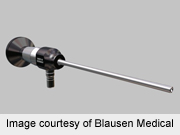- Could Your Grocery Store Meat Be Causing Recurring UTIs?
- Are You Making This Expensive Thermostat Error This Winter?
- Recognizing the Signs of Hypothyroidism
- 10 Strategies to Overcome Insomnia
- Could Artificial Sweeteners Be Aging the Brain Faster?
- Techniques for Soothing Your Nervous System
- Does the Water in Your House Smell Funny? Here’s Why
- Can a Daily Dose of Apple Cider Vinegar Actually Aid Weight Loss?
- 6 Health Beverages That Can Actually Spike Your Blood Sugar
- Treatment Options for Social Anxiety Disorder
Despite Proper Cleaning, Endoscopes May Pass on E. coli


An E. coli outbreak at an Illinois hospital was caused by endoscopes that had bacterial contamination despite being disinfected in the recommended way, a new study says.
The outbreak occurred among patients who underwent procedures with duodenoscopes, which are specialized endoscopes used to diagnose and treat problems in the bile and pancreatic ducts. These are not the same type of endoscopes used for routine endoscopy of the upper digestive tract or for colonoscopies, according to the researchers.
“The complicated design of duodenoscopes makes cleaning difficult. It appears that these devices have the potential to remain contaminated with pathogenic bacteria even after recommended reprocessing is performed,” Dr. Lauren Epstein, of the U.S. Centers for Disease Control and Prevention, and colleagues wrote in the study.
“Facilities should be aware of the potential for transmission of antimicrobial-resistant organisms via this route and should conduct regular reviews of their duodenoscope reprocessing procedures to ensure optimal manual cleaning and disinfection,” they concluded.
The study appears in the Oct. 8 issue of the Journal of the American Medical Association.
A number of patients were infected with, or exposed to, a highly drug-resistant strain of E. coli through duodenoscope procedures at the teaching hospital between January and December 2013, according to the study.
Investigators found that the hospital followed all manufacturer-recommended duodenoscope reprocessing (such as cleaning) instructions. After the hospital changed to a gas sterilization method, there were no more cases of this type of E. coli among patients who underwent duodenoscope procedures.
Health care providers should report and publish all cases of infectious diseases linked to endoscopy, particularly if recommended reprocessing procedures were followed, in order to determine whether this study “is the tip of the iceberg or an isolated occurrence,” William Rutala and Dr. David Weber, from University of North Carolina Health Care, wrote in an accompanying editorial.
“If the former, then revision of the endoscope reprocessing guidelines will be necessary to ensure patient safety,” they said.
More information
The U.S. National Library of Medicine has more about endoscopy.
Source: HealthDay
Copyright © 2026 HealthDay. All rights reserved.










